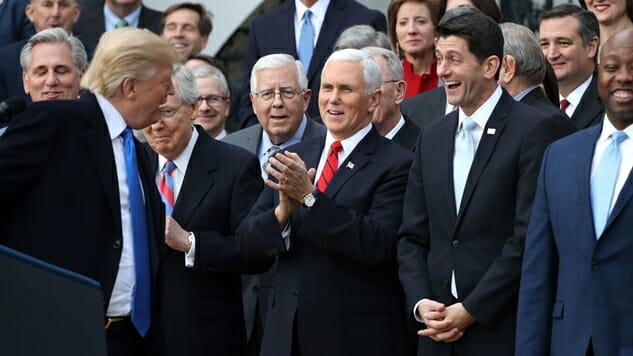Evergreen Headline: Social Security and Medicare Will Be Insolvent Sooner Than We Think
Photo by Chip Somodevilla/Getty
Stop me if you’ve heard this before, and you have definitely heard this before.
BREAKING: Government: Medicare will become insolvent in 2026, three years earlier than expected, Social Security to follow in 2034.
— The Associated Press (@AP) June 5, 2018
Social Security and Medicare are two of the greatest accomplishments in this nation’s history. They are a reminder of what our government can do when we use it to help our most vulnerable instead of feeding them into the wood chipper that is our ruling class’s interests. It’s easy to take them for granted now, since we know of no world that exists without them, but before we enacted two of the largest safety net programs in this nation’s history, seniors were extremely vulnerable. Per Benjamin Veghte, of the National Academy of Social Insurance:
Remarkably, for 80 years, through numerous wars and recessions, Social Security has never missed a payment, and has never contributed a penny to the federal debt. Self-financed through contributions by workers and their employers – augmented since 1983 by taxes on benefits – with its annual surpluses invested in U.S. Treasury Bonds, Social Security is walled off from the tumult of both the stock market and annual appropriations battles. While the rest of the government can – and does – accumulate debt, Social Security must, by law, live within its means.
Before Social Security, in 1934, roughly one half of seniors were estimated to be poor. Most had to rely on family or friends, or go to the poor house. As ever more seniors paid into Social Security and then received retirement benefits, the poverty rate among seniors steadily declined from circa 50 percent in the Great Depression to 35 percent in 1959, 25 percent in 1970, 15 percent in 1975, and around 10 percent in 2000, where it has hovered ever since. Today, were it not for Social Security, the senior poverty rate would be 43.5 percent, and just over half(PDF) of elderly African Americans (51 percent) and Latinos (52 percent) would be poor.
Social Security provides working families insurance against wage loss throughout the life span. Twelve percent of children(PDF) rely on Social Security benefits, either as dependents of retired, disabled or deceased parents (or grandparents), or because another adult in their household receives benefits. No one ever plans on becoming disabled, but just over 1 in 4 people(PDF) who turned 20 in 2013 are projected to become severely disabled during their working years. 151 million working Americans, and their families, are insured through Social Security against income loss due to disability. 212 million Americans, and their families, are insured through Social Security against income loss due to old age or death. In sum, Social Security not only provides the primary retirement security for most working families, but also our primary disability and life insurance protections.